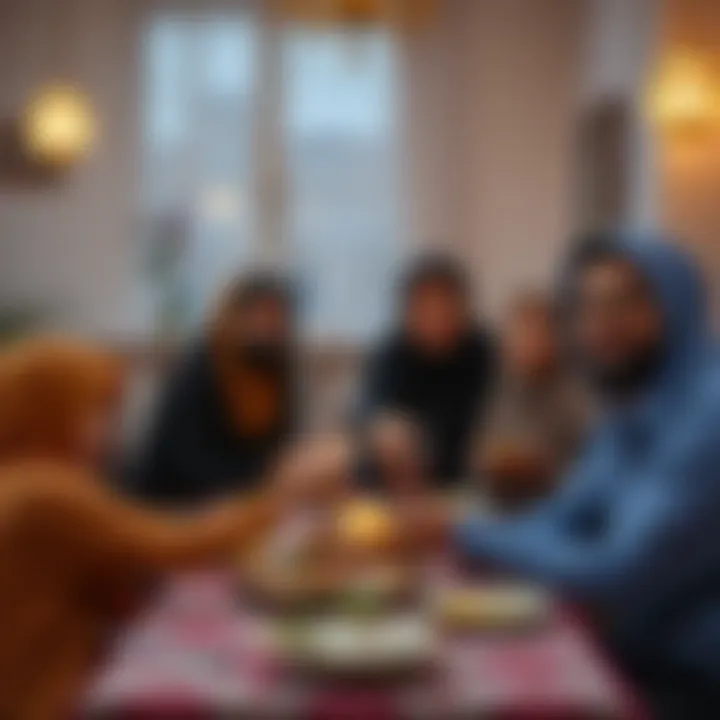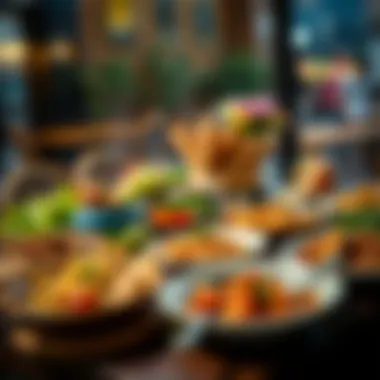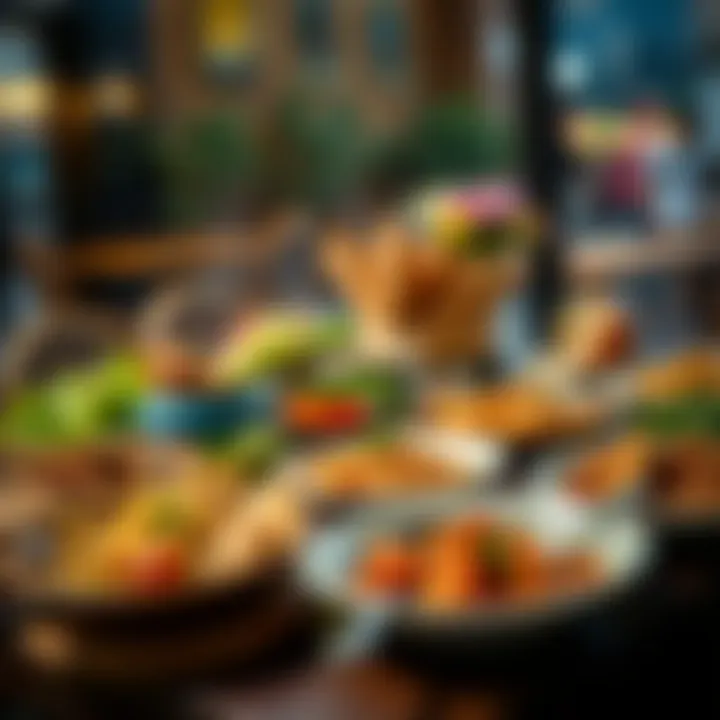Iftar Times During Ramadan 2024: Insights and Variations


Intro
As the crescent moon heralds the onset of Ramadan, a month of fasting, prayer, and reflection unfolds for Muslims worldwide. One of the focal points of the day during this holy period is iftar, the evening meal breaking the fast. Understanding the timing and customs surrounding this meal provides a deeper appreciation of Ramadan's spiritual and cultural significance.
Iftar times vary depending on geographical location and local traditions. In larger metropolitan areas, the timing is often broadcast on community platforms and Islamic centers, ensuring everyone observes the fast in unison. Yet, even within regions, there can be variances due to differences in sunset times, necessitating awareness of local timings.
Beyond the clock, iftar is a time rich with meaning. It's not just simply about eating; it encompasses family gatherings, community spirit, and the sharing of resources. Each meal carries with it an intricate tapestry of cultural influences, historical significance, and communal efforts to uphold the values of charity and gratitude.
Ultimately, this article seeks to illuminate the nuances of iftar in 2024, exploring not just the 'when' but also the 'why'—the pivotal role it plays within the broader context of Ramadan. Through the following sections, we aim to provide a comprehensive overview that is both informative and reflective, ensuring that readers gain insights into this deeply enriching aspect of Islamic observance.
Prolusion to Ramadan and Iftar
Ramadan, a time of deep reflection and spiritual rejuvenation for millions worldwide, embodies more than just a month of fasting. For many, this period holds immense significance, marking a time when believers strive to connect more profoundly with their faith. Iftar, the meal to break the daily fast, takes center stage each evening during Ramadan, serving as a beacon of community and tradition.
The essence of Iftar stretches beyond mere sustenance. It symbolizes solidarity among Muslims, inviting families, friends, and even strangers to gather around the table. The anticipation of Iftar, often celebrated with dates and water, fosters a unique camaraderie, reinforcing cultural bonds while echoing shared religious principles. As the sun dips below the horizon, the joy of breaking the fast becomes a daily highlight, a moment intertwined with spirituality and fellowship.
The Significance of Ramadan in the Islamic Calendar
Ramadan is the ninth month of the Islamic lunar calendar, and its importance cannot be overstated. This month is widely regarded as a time for Muslims to purify their souls, foster empathy for the less fortunate, and engage in heightened prayer and reflection. One fundamental aspect of Ramadan is the act of fasting, observed from dawn until sunset. This means abstaining from food, drink, and other physical comforts. The Qur'an was revealed during this sacred month, particularly emphasizing its significance in the Islamic faith.
As each year rolls around, the timing of Ramadan shifts due to the lunar calendar. This variability not only enhances the experience of fasting—by placing it in different seasonal contexts—but also emphasizes the importance of adaptability in faith. For instance, while fasting in summer might push individuals to confront heat more directly, Ramadan in winter offers unique challenges of its own. These seasonal shifts add layers of experience and reflection to each Ramadan, enriching the individual's spiritual journey.
One might say Ramadan is a reset button. The rigorous practices during this holy month encourage believers to renew their commitment to faith, charity, and community. From sunrise to sunset, the focus shifts towards self-discipline. Individual reflection becomes communal celebration, particularly during Iftar, where the spirit of giving and hospitality shines brightly.
Understanding Iftar: Breaking the Fast
Iftar, derived from the Arabic word for breakfast, isn't merely about food; it embodies tradition, togetherness, and gratitude. Upon breaking the fast each day, Muslims honor the practices of the Prophet Muhammad, who broke his fast with dates and water. This traditional method has transcended time, with many families sticking to this age-old custom.
Across cultures, Iftar rituals can vary widely. In some households, it's a simple affair with dates, water, and maybe a cup of tea; in others, it transforms into a feast, showcasing an assortment of dishes that reflect cultural heritage.
- Common Iftar Foods:
- Dates and water
- Lentil soup
- Kebabs and biryani
- Salads and fruits
In some regions, communities come together larger events, with mosques hosting gatherings to share meals, invite the less fortunate, and create a spirit of giving. This echoes the social responsibility tied to Ramadan, emphasizing the month’s role in fostering social equity and solidarity.
Moreover, as the fast approaches its end each day, the atmosphere becomes charged with excitement and anticipation. The sound of the adhan—the call to prayer—fills the air, prompting families to gather, reflect, and share. This moment becomes a celebration of gratitude, acknowledging the blessings of food and fellowship.
As Ramadan 2024 approaches, understanding both the deeper significance of this month and the cherished rituals surrounding Iftar proves beneficial. Navigating through these experiences surely enriches one's spiritual journey and deepens the understanding of community ties within the Islamic tradition.
Iftar Timing in Ramadan
The timing of iftar is a critical aspect during Ramadan, serving as a daily reminder of faith and gratitude. Observing the iftar at the precise moment when the sun sets is not just about breaking the fast; it’s about connecting with tradition, feasting with family, and reflecting on spiritual growth. The nuances involved in determining the time of iftar range from geographical differences to individual practices, significantly enhancing the significance of this meal.


Key Factors Influencing Iftar Timing
Iftar timing can vary widely based on multiple factors, shaping how communities celebrate this cherished moment. Here are a few key elements that come into play:
- Geographic Location: Just as the sun rises and sets at varied times across the globe, so too does the timing of iftar. For instance, someone in London will break their fast later than someone in Riyadh due to differences in latitude and local time zones.
- Date of Ramadan: Each day during Ramadan, the timing shifts slightly. As the month progresses, sunset occurs later, meaning iftar timings need to be adjusted accordingly.
- Local Customs: Each region has its own practices, sometimes dictated by local religious authorities, which can affect when iftar is said to occur. These customs might include waiting for particular calls to prayer or visual cues.
- Date Adjustments: In some communities, the sighting of the moon can determine the start or end of Ramadan, thus influencing iftar timings either by day or two, depending on how the lunar calendar aligns.
Understanding these factors aids not only in planning meals but also enhances a sense of community as people come together to break their fast at the appropriate time.
Calculating Iftar Times: An Astrological Perspective
Many Muslims turn to astrology and astronomical calculations to find the precise moment of iftar. While there are practical ways to determine it based on admitted religious guidelines, astronomy adds a layer of depth to this tradition. Here’s how:
- Sunset Calculations: The core principle for iftar timing is the moment the sun dips below the horizon. Several astronomical calculations can guide this. For example, most Islamic organizations provide annual calendars indicating these timings based on sophisticated equations of solar positioning.
- Apps and Technology: With the rise of mobile applications, even casual observers can determine iftar timings with just a glance at their smartphones. These apps use location services to provide real-time sunset data tailored to the user’s geographical position.
- Community Input: There’s often a communal element to iftar timing as well. In many Islamic communities, local mosques will announce iftar times through loudspeakers or social media, ensuring everyone is synchronized in their observations.
Regional Variations in Iftar Timing
Understanding the regional variations in Iftar timing is crucial for those observing Ramadan. It sheds light on how geography, culture, and local customs influence when Muslims break their fast. With diverse traditions and methods for calculating Iftar times, each region adds its unique flavor to this sacred meal, making it not just a matter of time but a celebration of culture and community.
Iftar Times Across Different Countries
Iftar times vary significantly from one country to another. Key factors include the country’s latitude, longitude, and the time of the year, all of which affect sunset timings. For instance, in a country like Saudi Arabia, where the days are longer, the Iftar can occur quite late compared to countries closer to the Equator, where the duration of daylight stays roughly consistent year-round.
- Middle East: In places like Egypt and Jordan, Iftar is traditionally announced with the sound of cannons or calls to prayer at sunset, typically around 6:30-7:15 PM. In some areas, large gatherings around mosques signify the communal nature of the meal.
- Southeast Asia: In Indonesia and Malaysia, Iftar times can vary but generally fall between 6:30 PM and 7:00 PM. Popular local foods such as dates, sweet cakes, and traditional soups are commonly served at this time.
- Western Countries: In the United States or European countries, Muslims often rely on Islamic apps or community announcements to keep track of Iftar. Here, the time can vary greatly; for example, in cities like New York or London, individuals breaking their fast may do so between 7:30 PM and 9:00 PM as daylight extends into late evenings.
Local Adjustments: How Cities Adapt
Cities worldwide adapt Iftar timings not only to natural daylight changes but also to local traditions and community needs. For urban areas that are densely packed, such as Istanbul or Cairo, communal spaces fill with people during Iftar. Here’s how some cities make adjustments:
- Lighting and Sounds: Urban centers often employ illuminated displays and loudspeakers to notify residents when it's time for Iftar. This helps synchronize the community and brings people together in celebration.
- Public Spaces: In major cities, public parks and squares become popular spots for communal Iftar meals. Authorities sometimes set up tables and chairs, allowing people to gather, share food, and enjoy each other's company.
- Online Platforms: In cities like Dubai, people utilize social media and mobile apps to coordinate their Iftar gatherings. As expatriate communities grow, international foods might make their way to the table, blending traditions from various cultures.
The Role of Community in Iftar
Iftar is more than just a meal; it serves as a thread that stitches communities together during the sacred month of Ramadan. The communal aspect of Iftar cannot be overstated – it’s where the act of breaking fast unites friends, families, and neighbors in a shared experience that transcends individual observance. During this time, the importance of community manifests in many forms, offering benefits that reach beyond the dining table, fostering connections that can extend far beyond the blessed month.
Community involvement during Iftar promotes a collective spirit. It encourages the sharing of food, ideas, and resources, creating a nourishing environment where everyone contributes to the well-being of others. This shared sense of responsibility significantly enhances the social fabric, inviting individuals to participate actively rather than remain isolated.
Iftar Gatherings: A Cultural Tradition
The practice of gathering for Iftar is steeped in rich cultural traditions across various communities. From grand family feasts to intimate neighborly get-togethers, these gatherings play a vital role in reinforcing bonds.
- Family Reunions: Many see Iftar as an opportunity to bring family members together. Whether families share dishes prepared at home or order from their favorite restaurants, it becomes a time to catch up.
- Community Events: In urban settings, mosques and community centers often organize large Iftar events. These gatherings allow individuals from diverse backgrounds to share a meal under one roof. It's not just about food but about cultural exchange and strengthening community ties.
- Volunteering: Many communities take it a step further by organizing charity Iftars, where meals are provided for those in need. This aspect of communal dining reflects the spirit of giving that Ramadan embodies.
Sharing Iftar: The Importance of Hospitality
Hospitality is another keystone of the Iftar experience. In many cultures, the act of inviting others spills over into the realms of generosity and kindness, forging relationships built on mutual respect and care. This is particularly significant because it fosters inclusivity, especially for those who may be far from home or lacking a family to share the meal with.


Inviting neighbors to join in Iftar promotes harmony and understanding, oftentimes disarming social and cultural barriers. It sends a powerful message that we stand together, regardless of diversity. Here are some nuanced points to reflect on:
- Gifts and Gestures: It’s common to see individuals prepare additional plates of food to share with neighbors or even donate to community kitchens. Such gestures show thoughtfulness and extend the spirit of Ramadan well beyond one’s own household.
- Strengthening Relationships: By inviting others for Iftar, relationships are nurtured. Whether rediscovering connections with long-lost friends or forging new ties with acquaintances, these moments become the building blocks of a supportive community.
"Sharing a meal has always been intrinsic to human connection, but during Ramadan, it takes on added significance, transforming strangers into friends and neighbors into family."
Through these communal culinary experiences, individuals can create lifelong memories rooted in the traditions of Iftar, which will undoubtedly enrich future generations of observance, transcending mere fasting to become a heartfelt celebration of community spirit.
Health Considerations During Iftar
When it comes to Iftar during Ramadan, health should be at the forefront of each participant's mind. After a long day of fasting, the way you break your fast can greatly impact your physical well-being and overall energy levels for the remaining months. This section will cover the essence of good nutrition and the pitfalls one can fall into during this significant evening meal.
Balanced Nutrition at Iftar
Breaking your fast with the right foods is crucial. It’s not just about satisfying your hunger but about fueling your body properly. The goal should be to consume a balanced meal that incorporates a variety of nutrients to rejuvenate your energy levels.
- Hydration: Start with water or a fresh fruit juice, considering that your body has had no fluids all day. This helps rehydrate your body, kickstarting metabolic processes.
- Complex Carbohydrates: Foods like whole grain bread, brown rice, or lentils provide energy that lasts longer. They help maintain stable blood sugar levels, preventing those mid-evening energy crashes.
- Proteins: Think about incorporating lean meats, legumes, or dairy. Proteins are fundamental for recovery after fasting, aiding muscle repair and keeping you feeling full longer.
- Fruits and Vegetables: A mix of colorful fruits and veggies can provide essential vitamins and minerals. Fresh dates, for instance, are not only traditional to break the fast but also rich in fiber and nutrients.
To sum up, a well-rounded Iftar plate can make all the difference. Preparing your meal in advance can help ensure you have all styles of food covered.
Common Mistakes to Avoid During Iftar
While the joy of breaking fast is palpable, there are common missteps that many make when it comes to Iftar. Recognizing these can help you have a healthier experience.
- Overeating: It’s tempting to dive into an extravagant spread, but overeating can lead to discomfort and sluggishness. Start slow, and ensure you listen to your body's signals.
- Skipping Hydration: People occasionally forget to drink enough fluids during the Iftar meal. Dehydration can sneak up on you, especially if meals are high in salt. Keep that water handy!
- Neglecting Nutritional Balance: Some might fill their plates mainly with sugary pastries or fried items. While these may be tempting, they can hinder health and energy levels the following day.
- Ignoring consistent meal times: Iftar should ideally be at the same time each day or as close as possible to maintain a regular eating pattern. This can assist with digestion and stable energy.
"A little planning goes a long way. What you decide to eat at Iftar can influence your health not just for the evening, but for your day ahead as well."
Balancing your meal and making conscious decisions about what you eat can enhance not only your physical health but also your overall experience of Ramadan. With these considerations in mind, you can embark on a fulfilling journey this Ramadan, focusing not only on spiritual growth but also on your physical well-being.
Iftar Traditions Around the World
Iftar is a daily celebration during Ramadan that transcends mere hunger relief. It's a window into diverse cultural practices and traditions, each uniquely reflecting a community’s identity and values. In today’s interconnected world, understanding these traditions is not just academic; it builds appreciation for the shared yet distinct experiences surrounding iftar across different cultures. Observing these customs can enhance the overall Ramadan experience, offering insights into how various communities uphold their culinary legacies.
Exploring Diverse Iftar Customs
Every culture has its particular rituals that accompany the breaking of the fast, and these practices vary widely across the globe. For instance, in Morocco, iftar begins with harira, a rich soup made with tomatoes, lentils, and spices. This dish stands out not only for its flavor but also for its historical significance as a communal dish designed for sharing.
Meanwhile, in Turkey, the table is often set with a variety of foods, including simit (sesame-encrusted bread), olives, dates, and cheese. The traditional way to break the fast is quite engaging; many start by drinking water, reflecting on patience and gratitude for the day's blessings.
In South Asia, particularly in Pakistan and India, you might find samosas and dahi as staples at iftar gatherings. Families often come together to share these savory pastries and yogurt, highlighting the community aspect of the meal.
“Food is the common ground. It unites us beyond language and geography.”
Across Southeast Asia, variations exist as well. In Indonesia, for example, kolak—made from bananas and sweet potato in coconut milk—is a popular iftar dish, often enjoyed alongside fried snacks. Such adaptations are not just limited to the main meal; beverages are also a significant aspect, with many places offering refreshing rose milk or tamarind drinks.


Subtle differences in customs and practices remind us of the richness of Islamic traditions and their capacity to adapt to local tastes while remaining faithful to the spirit of fasting.
Unique Dishes Served at Iftar Globally
Iftar meals are a kaleidoscope of flavors, each region contributing its unique dishes that reflect its culture and history. Different countries boast astonishing varieties that could intrigue anyone, even the most seasoned food enthusiast.
- In the Arabian Peninsula, dishes like kabsa, a spiced rice dish with lamb or chicken, are common. This meal isn't just food; it represents hospitality and abundance.
- Across the Mediterranean, stuffed grape leaves, commonly known as dolmas, and fattoush, a refreshing salad made with crispy bread, signify the joyful reunion of friends and family around the table.
- The plateau de fruits de mer in North Africa—a display of marinated seafood and seasonal vegetables—positions iftar as a time for indulgence and culinary delight.
- Down in West Africa, savory pancakes called akara, made from black-eyed peas, and often paired with spicy sauce, showcase local ingredients while bringing people together.
What makes these dishes even more special is the stories they tell. Each recipe is tied to the land, the seasons, and, importantly, to the families that pass them down through generations enlivening the act of breaking fast.
In the end, iftar is more than just a meal; it is an expression of faith, culture, and community rich in flavors and stories from every corner of the globe.
Technology and Iftar Planning
In today's fast-paced world, technology plays a ubquitous role in enhancing our daily lives, and it is no different during the holy month of Ramadan, especially concerning the important ritual of iftar. As Muslims around the globe break their fast, leveraging technology to organize and enhance the iftar experience has become increasingly popular. Embracing these tools not only brings convenience but also fosters a sense of community and connection among families and friends.
Utilizing Mobile Apps for Iftar Scheduling
Mobile applications dedicated to Ramadan planning can revolutionize the way individuals manage their iftar timing and meal preparation. These apps provide numerous functions that cater to various needs, making it easier for users to engage in this key ritual.
- Accurate Timing: One of the primary advantages of these apps is their ability to give accurate iftar times based on the user's geographical location. This helps avoid the confusion of time discrepancies, ensuring everyone can break their fast together.
- Meal Planning: Many of these tools include features for meal planning, allowing users to organize their menus ahead of time. They may offer traditional recipes from different cultures, which adds an exciting twist to the evening meal, fostering culinary exploration.
- Reminder Notifications: Some of these apps come with customizable notifications that serve as reminders for iftar times and help people stay on track with their fasting schedule.
- Integration with Social Media: A lot of mobile applications enable users to share their iftar experiences on social media platforms like Facebook or Instagram, promoting a sense of community and keeping family and friends connected, even if they are miles apart.
Incorporating these apps into one's Ramadan routine results in a more engaging and organized approach to iftar, which adapts to individual lifestyles and preferences.
Online Communities and Iftar Sharing
In addition to scheduling tools, online communities offer a supportive environment for sharing the iftar experience. Platforms like Reddit and Facebook have groups dedicated specifically to Ramadan, where people can connect, exchange recipes, and share iftar stories and experiences. These communities provide a space where shared traditions enhance the spirit of togetherness.
- Shared Experiences: Members often post about their iftar gatherings, showcasing unique dishes from various cuisines. This can inspire others to try new recipes or adapt traditional meals from different cultures, promoting culinary diversity.
- Nutritional Support: Many communities focus on health and wellness during Ramadan, discussing the importance of balanced nutrition in iftar meals. Supportive peer discussions can provide valuable insight and advice on maintaining health while fasting.
- Event Planning: Online forums allow individuals to coordinate community iftar events, ensuring that everyone has a chance to partake in the ritual, especially for those who may not have family nearby. This collective effort fosters unity, brings people together, and strengthens the bonds within the community.
Engaging with technology and online communities during Ramadan not only enriches the iftar experience but also facilitates cherished connections among individuals, families, and communities far and wide.
By bringing technology into play, Muslims around the world can make the process of preparing for iftar not only enjoyable but also inclusive, embracing the true spirit of Ramadan with every shared moment.
Culmination: Reflecting on Iftar in Ramadan
Iftar holds a pivotal role during the holy month of Ramadan, serving not just as a daily meal to break the fast but also as a powerful symbol of community and reflection. It’s that cherished time when families and friends gather, putting life’s fast-paced rhythm on a brief pause. This act of sharing sustenance extends beyond food; it nurtures the bonds between individuals and celebrates the essence of solidarity in a spiritual context. The importance of this ritual cannot be overstated, as it embodies compassion, charity, and a grateful heart.
The Lasting Significance of Iftar
The practice of iftar has deep roots in Islamic tradition, tracing back to the time of the Prophet Muhammad. With each sunset during Ramadan, when the call to prayer echoes in the air, it marks a time for reflection and gratitutde. Participants often prioritize sharing iftar meals with the less fortunate, embodyng the spirit of giving that is at the core of Ramadan.
From a nutritional standpoint, the meal is crafted to replenish lost energy after a day of fasting. It typically begins with dates and water, a nod to the traditions of the Prophet. This ritual is more than just a physical nourishment; it serves as a reminder to be thankful for one’s blessings, aligning with the principles of self-restraint and reflection that define the month. In many societies, these gatherings transform into community events where people from diverse backgrounds come together, resembling a melting pot of cultures and shared experiences. As such, iftar transcends mere sustenance; it develops layers of meaning that resonate well beyond the physical act of eating.
Looking Ahead to Future Ramadans
As we set our sights on the future, the significance of iftar continues to evolve. Today's technology affords us new and innovative ways to experience this important moment. From utilizing mobile applications for precise iftar timings to global online communities sharing their recipes and traditions, the essence of iftar remains intact while adapting to modern life.
Moreover, as globalization prevails, diverse iftar customs will likely intertwine, creating unique culinary fusions that reflect a blend of cultures. This fluidity presents a splendid opportunity for future generations to cultivate a more inclusive understanding of Ramadan customs. Recognizing the new ways people engage in iftar will shape its practices and significance in years to come.
In the end, iftar is not merely about the food on the table. It's about cultivating connections, fostering understanding, and promoting compassion among communities. As we anticipate Ramadan in the years ahead, embracing the core values of this sacred ritual will continue to enrich lives around the world.







